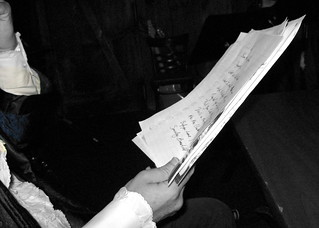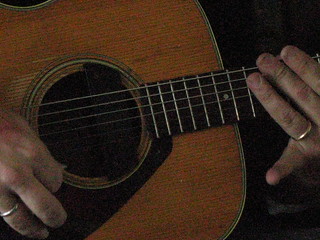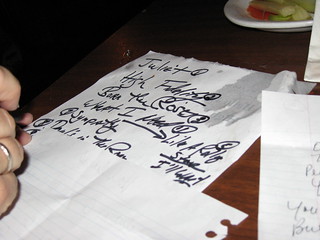A hobby is a regular activity or interest that is undertaken for pleasure, typically done during one's leisure time.
Okey dokey pokey. But what about if you have a regular activity that is done for pleasure but it is also your passion? And your uncompromising soul screams to be able to make a living at it, as others have done? And you have seen these people in real life! Most of the people that have become well known for their artistic craft have had day jobs at some point and they found pleasure in what they were doing off the clock. So what is the tipping point?
Today in the New York Times, Tim Kreider FINALLY said what I have been talking about for the past forever. Here is a link to his article that hits it on the head:
Slaves of the Internet, Unite!
In his great article, he focused more on the publication of words than on Music, though he touched on it for a bit, and what he did he got right. But let's go more into that realm of Music, shall we?

Last night I attended a concert of four cover bands at a bar in Jersey City, NJ. A beloved friend was playing bass in a Pixies cover band and they, along with all the other bands, really did a great job. AND, the place was PACKED! I mean wall to wall flesh, and this sea of costumed bar revelers adored the bands and really got into the Music. It was wonderful to watch.
BUT, was anybody in any band paid? No. My friend on bass who was driving home gave me one of her "free drink tickets" that was her "payment." When I went to the bar to use it, I was only allowed to get the worst beers or a very restricted selection of the bottom shelf garbage booze. WHAT? Not only were the musicians given token compensation for their hours and hours of prep work and performance, but it was a restricted compensation, only allowing swill to be given. The worst part was that none of the Musicians cared they were being treated like this. None.
I understand the fact that it can be economically difficult to pay a band decent compensation when it is a bad night at the establishment, but that is not the band's fault. They are providing a service. Do you think the chef at a restaurant does not get paid when things are slow for a night? Nope. It is not the band's responsibility to bring people to the place they perform. Period. If they suck as musicians, then they should not be asked back. But, as independent contractors, they are paid to play music. Period. End of argument.
But last night was the soul crusher. This bar was making tons and tons of money. If they had even paid the bands SOMETHING, they still would have come away with a good amount of profit. But no. They gave the bands free tickets for garbage booze when they were rolling in the cash.
And please allow me to state that, for all of their idealism, actual and theoretical, musicians respond to money. Very well, actually. James Brown had one of the best bands in the world. Why? Well, one reason was because he used to fine each musician for every time they made a mistake onstage. The Pavlovian Godfather of Soul knew what he was doing.
It is here that you may be saying that every musician gets hooked into the life they lead by swallowing the four pronged hook of Rock and Roll Mythology: "A life in Music will grant me what my heroes have: Money, Fame, Drugs, and Sex in unlimited quantities." If this fails, then they get what they deserve. But what do they deserve?

As stated in Mr. Kreider's article, no other occupation runs on these expectations of production of a product having no value. And please allow me to state that any musician you see up on a stage that is doing what they do well has spent hundreds if not thousands of hours at their craft, and perhaps over a hundred thousand dollars and their youth getting good at their instrument. With the news media buzzing like a cloud of angry cicadas on Red Bull about health care, please take one second to remember that no doctor will do surgery for free, no pharmacist will allow you to get a prescription of cash value for free and no emergency room will treat you for free. If you do not pay,the bill will just get passed along the chain to others that do pay while all the workers in the chain do not miss a paycheck. Someone is paying, even if you are not.
As stated in Part One of this section, recorded Music has little to no value to the consumer. The only place where money is to be made is in movies, commercials, and television. All the streaming websites that people devour pay literally pennies per play. Calculate how many plays it would take of one song to pay one month's rent. Now look in the mirror and realize you are not Justin Timberlake. And now realize that you are screwed.
Placement in movies and commercials and television can be beneficial, but the bulk of what is bought is not Music made by the artist for the joy of it. It is Music made to fit a specific concept the producers have, which 90% of the time is a rip off of a popular song they cannot afford to pay for; so they hire some schlub to write a knock off of something similar, pay them next to nothing, make the writer hand over all rights to the Music, and send them on their way to make more sausage made of sounds.
There was a golden age of guitar based rock Music and that has passed, with the first ring from the death bell coming at the raising of the drinking age from 18 to 21. The next chime came with quality DJ's coming in and charging less, as well as insurance companies charging more for policies that catered to live Music. Next came digital file sharing and finally the access to free recording devices that could, regardless of the lack of ability or talent from the performer, digitally manipulate performances into listenable pieces of organized sound. With a commodity having no scarcity and no cost of production combined with a never ending desire of consumption we are now here. But where is here?
I am not going to say that all new Music sucks. That is insane as I personally know people with inspiring talent. I am not going to say that nobody goes to live shows because I just played a show opening for and playing with the poet Buddy Wakefield and the room, while small, was packed. But I will say this: the value placed upon Music has, by all quantitative measures, reached a low point that nobody had seen coming. The Music companies which are now MULTI MEDIA companies, shall always find a way to turn a buck on sound and visuals. And never ever for a damned second ever believe that they are hurting for money. They are simply not as wealthy as they used to be, but the executives are still, and always shall be, wealthy.
No medium can truly grow when the makers of it are not given some affirmation of its value by the outside world. The makers feel disillusioned and confused, believing with everything they have that they have done great work but having nobody willing to pay for it. Please remember that this equation did not work out very well for Van Gogh. Read his letters and see how the fact that nobody would care at all about what he did led him to the depths of despair.

All creative people need time to learn their craft and this means by doing it. But it should not mean doing it for free! For a lesser rate, perhaps, but not free. If one gets paid for a job well done, one is more likely to do a better job the next time. Money is nice, ya' know? But this new system has made every musician and writer, regardless of experience and sacrifice, equal. And what is that equality?
I just played a show at a coffee house and the owner has been wonderful to me and my band. The place is clean and warm and a joy to play at. However, they pay me and the band nothing. It was never even discussed. I will play there again soon to get ready to record my solo acoustic album, as I find nothing is a better editor of songs than doing them live. But in the end, I will be doing the two hours of set up, two hours of performance, and one hour of tear down simply to be better at documenting my compositions this December when I record them. The owner of the establishment will most likely thank me for my performance, but I simply was a live iPod for an evening. My presence has no real value to him. He may LOVE my band, for which I am very grateful, but there is no exchange of compensation.
A life in creativity is never easy for the majority of the players and I doubt it will ever get any better. The saying goes that you get nothing for nothing.
There you have it, the new artistic equality of the digital age.
+++++++++++++++++++++++++++++++++++++++++++++
ADDENDUM: I have just found out that the concert that night where my friend played bass and got swill for drinks was actually a benefit concert for the local arts association, one I know very well and deeply support. However, I had NO idea that it was a benefit because nobody announced it was a benefit, it was in no way obvious on the flier that it was a benefit, nobody from the association stated at the beginning of the night at the bar that it was for their cause, and there was no place to give additional contributions for the cause which many people would have.
I have put on many benefit concerts in my lifetime and I have always tried to treat the musicians who gave of their time with the utmost respect. And, it is ALWAYS obvious to everyone attending that it is a benefit for some cause. If you wish to make the argument that none of the bands were getting paid anyway then I counter that proposal with the following:
Giving away your time and talent for a cause does not mean being disrespected or used.
And even if we take away all reimbursement for all the musicians on stage that night stating that it went to a greater good, I present this: one of the musicians in one of the bands helped with the complicated logistics of the night (there was another stage across town), stayed there all day to make sure everything worked out AND supplied the entire back line for the evening (the drums, the bass and guitar amps). At the end of the night, for all that, he was given by the sound guy, by a fellow musical worker, the pay for well over 24 hours of work and the use of $1000 of musical gear.......................................................................................................
$50.
I rest my case.